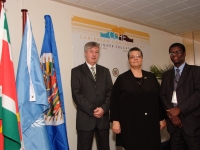Regional conference calls for more emphasis on higher education
 Versión Español
Versión Español
PARAMARIBO, April 13, 2010 – The Caribbean Conference on Higher Education (CCHE) came to a conclusion in the Surinamese capital, Paramaribo, Tuesday with a call to governments and institutions to take concerted actions to improve higher education in the Caribbean.
“The strategic and significant role of higher education lies in its ability to contribute to the development of knowledge-based, democratic and equitable-minded societies which promote sustainable social and economic development, social inclusion, peace, stability, justice and decent living standards for all citizens”, participants said in the ‘Declaration of Paramaribo’, which was adopted at the end of the two-day conference in hotel Krasnapolsky.
The meeting under the theme “Integration and Development of the Caribbean” concluded that it is essential to reaffirm the conviction emphasized in the 2009 World Conference on Higher Education (WCHE 2009) that higher education as a social public good, is the responsibility of all stakeholders, especially governments. It plays a strategic role in the processes of sustainable development of the countries of the Caribbean. Moreover, governments must commit to financial support of Higher Education.
Participants also support efforts that promote academic cooperation, collaboration, and internationalization between and among Caribbean higher education institutions to benefit students, teachers, researchers and the institutions themselves, with the goal of helping to bridge the development gap by increasing the transfer of knowledge across borders and reducing disparities in the areas of science, technology, and innovation.
Responding to the outcome of the conference St. Lucia’s minister of Education and Culture, Arsene James said that there are a number of mechanisms the Caribbean could implement to make its higher education institutions more competitive.
“For one, we must ensure quality assurance; our universities must be accredited and thirdly, we must be able to compete with other universities in Latin America and the world”, said the minister.
According to James, the conference has contributed tremendously towards achieving these goals. The objective is now to find ways for closer collaboration and integrate the education systems in the wider Caribbean to enable the identified mechanisms to work.
The ‘Declaration of Paramaribo’ further stipulates that the required policies should take into account the rich history, culture, literature and art of the Caribbean; the potential of international university networks and partnerships to enhance mutual understanding and a culture of peace; and the rapid pace of globalization in order to build a diverse, skills-based, inclusive, and perfectly integrated Caribbean and Latin American society.
According to the conference, internationalization and academic cooperation should be based on solidarity and mutual respect which must influence all aspects of public and institutional policies, teacher training, undergraduate, graduate and postgraduate offerings and continuing education.
“We recognize the importance of and need for greater regional cooperation of the Caribbean with the Latin American region and other regions of the world, particularly South-South and North-South-South cooperation to promote regional approaches to the most pressing problems. We should not let linguistic barriers impede the potential for cooperation and should take active steps to facilitate and promote policies and programs which support language learning to include the languages of the Caribbean and Latin America. Therefore, we call upon all Caribbean and Latin American higher education institutions to actively pursue opportunities for cooperation with each other, in regional networks and with regional and international organizations. All these are essential mechanisms for regional integration and internationalization, and must be a part of the agenda of the region’s governments, multilateral agencies, and public and private academic institutions”, participants said in the declaration.
The conference also called for support to rebuild Haiti’s higher education system which was severely affected by the January 12, 2010, earthquake. The conference brought together policy makers, educators and experts from the Caribbean and beyond to discuss issues ranging from accreditation, cooperation, integration, quality assurance and internalization of higher education in the Caribbean. The meeting was organized by the government of Suriname in collaboration with the Organization of American States’ (OAS) Department of Human Development, Education, and Culture (DHDEC), the UNESCO International Institute for Higher Education in Latin America and the Caribbean (IESALC), and the UNESCO Kingston Cluster Office for the Caribbean.
Once the Declaration of Paramaribo is signed and approved by all the participants, it will be available in the UNESCO-IESALC's web page.
For futher information, please contact Esta dirección de correo electrónico está protegida contra spambots. Usted necesita tener Javascript activado para poder verla.
See also:
CCHE coverage Day 2: EnglishCCHE coverage Day 1: English - Spanish - Portugues
Press Release of Opening Ceremony, April 11, 2010 : English - Spanish - Portugues
Press Release CCHE: English - Spanish - Portugues
Caribbean Conference on Higher Education: Photo Gallery
Programme: English (English in PDF Version), Español










